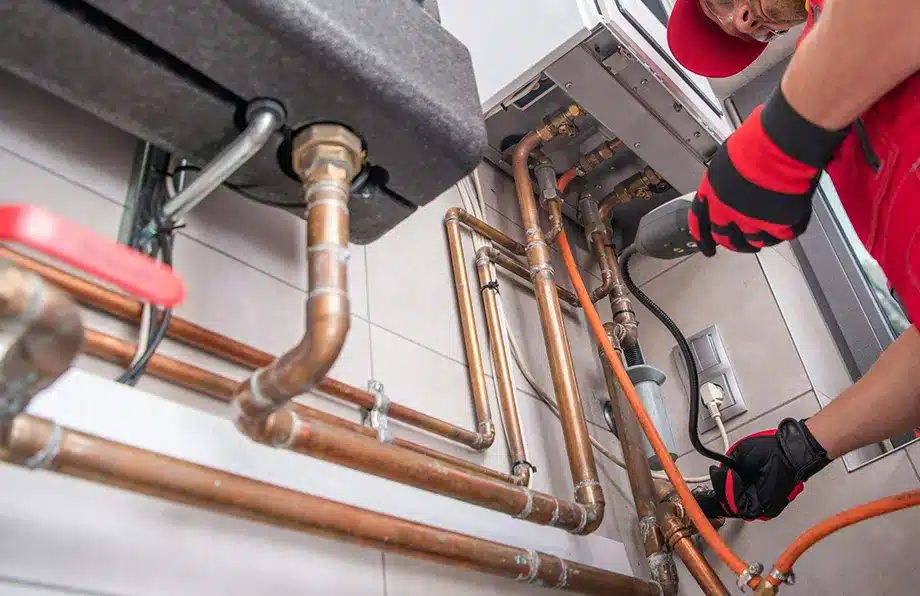Understand your rights to workers’ comp benefits after a workplace gas leak in Charlotte
Imagine this: You’re on the job in Charlotte when a gas leak strikes. The fumes leave you dizzy and nauseous, and in the aftermath, you’re left with not only health concerns but a mountain of medical bills.
If a gas leak at work has led to an injury or illness, you might be wondering: Am I covered under workers’ comp?
Fortunately, the answer is probably yes. In North Carolina, workers’ compensation offers financial assistance for qualifying workers injured on the job, and that can include exposure to hazardous substances like gas.
In this article, we’ll discuss your rights to workers’ compensation after a gas leak injury in Charlotte, including the types of injuries covered, the benefits available, and the steps you need to take to ensure you receive the compensation you deserve.
Is a gas leak a health hazard?
Yes, a gas leak is a significant health hazard at work or at home. Depending on the type and level of the gas in the air, it can lead to various health issues, including neurological problems, respiratory problems, suffocation, poisoning, and even death, if not addressed promptly.
Additionally, certain types of gas, like natural gas, are highly flammable, posing a risk of explosion and burn injuries.
How long before a gas leak is harmful?
The harm from a gas leak can occur within a short period, depending on the gas’s concentration and the exposure duration.
In cases of high concentration, a gas leak can be harmful within minutes, while smaller leaks might take hours or even days to reach harmful levels, but they still shouldn’t be ignored.
Additionally, since gas leaks carry a significant risk of explosion if the gas comes into contact with an ignition source, it’s crucial to evacuate the area and rectify the leak promptly to mitigate exposure risks and prevent potentially catastrophic injuries.
North Carolina worker killed in an aluminum chloride explosion
In June 2023, a worker was killed in an aluminum chloride explosion at the Darling Ingredients rendering plant in Wadesboro, North Carolina, leading to the shutdown of the facility.
Firefighters, who quickly responded to the hazardous materials call, reportedly observed a large smoke plume upon arrival. Officials later confirmed the worker’s death, and the company has initiated an investigation into the incident.
What are the symptoms of gas leak exposure?
While the symptoms of gas leak exposure can vary based on the type of gas, the duration of exposure, and the concentration levels in the area, some common symptoms include the following:
- Headaches and dizziness. These are among the most common symptoms, as many gasses can reduce oxygen delivery to the brain.
- Nausea and vomiting. Exposure to certain gasses can irritate the stomach and other parts of the digestive tract, leading to nausea and vomiting.
- Respiratory problems. Difficulty breathing, coughing, and throat irritation can occur, especially if the gas is an irritant or is toxic to the respiratory system.
- Eye and skin irritation. Some gasses can cause eye redness, itching, and skin rashes or burns upon contact.
- Fatigue and weakness. Reduced oxygen levels and the body’s reaction to the toxic substance can lead to a general feeling of malaise.
- Altered mental state. High levels of exposure can lead to confusion, disorientation, and even loss of consciousness.
If you suspect a gas leak in your workplace, it’s essential to evacuate the area immediately and seek fresh air. You should also report the leak to your supervisor and call 911 if necessary.
What are the most common types of gas leaks at work?
In North Carolina workplaces, gas leaks can arise from various sources, posing a threat to worker safety. Common types of gas leaks you might encounter at work include:
- Carbon monoxide leaks. These can occur in any workplace that’s burning gas or coal or using combustion engines, gas-powered tools, or faulty heating systems. Garage mechanics, construction workers, miners, longshore workers, and any employees in buildings with poor ventilation are at risk.
- Methane and other hydrocarbon gas leaks. These gas leaks are most prevalent in the oil and gas industry, affecting workers involved in the extraction, processing, and transportation of fossil fuels, including drillers, rig operators, and pipeline workers in the oil and gas industry.
- Chlorine gas leaks. These gas leaks pose a hazard for swimming pool maintenance, water treatment facilities, and industries using chlorine as a disinfectant or reagent. Pool maintenance workers and water treatment plant operators are particularly susceptible.
- Refrigerant leaks. Common in refrigeration and air conditioning systems, these leaks can affect HVAC technicians and workers in facilities with large cooling systems, like data centers or food storage warehouses.
- Ammonia gas leaks. These are common in agricultural settings, refrigeration units, and certain manufacturing processes. Workers in agriculture handling fertilizers, those working in refrigerated warehouses, and employees in industries using ammonia in manufacturing processes face higher risks.
- Chemical gas leaks. These can happen in laboratories, manufacturing plants, and chemical processing facilities. Workers dealing with chemical storage, piping, and processing equipment, such as chemical plant operators and lab technicians, are at increased risk.
- Natural gas leaks. These leaks often occur in industries such as utilities, construction, and any workplace that uses natural gas for heating or operations. Utility workers, plumbers, and HVAC technicians are particularly at risk.
Workers in these and other sectors should be aware of the potential hazards and ensure that proper safety protocols are in place to prevent and respond to gas leaks. Regular training, proper equipment maintenance, and the use of personal protective equipment (PPE) are critical to minimizing the risks associated with these gas leaks in the workplace.
Lack of Training:
The Deadly Reality for
North Carolina Workers
Understand the high costs of inadequate training in the workplace and your rights after a work injury caused by a lack of training.
What happens if there’s a gas leak at work?
In North Carolina, workers who are injured or become ill due to a gas leak at work may be eligible for workers’ compensation benefits.
Workers’ compensation operates under a no-fault system, meaning employees do not need to prove their employer was at fault to receive benefits. However, the injury or illness must be directly related to the job and occur during the course of employment.
Most employers in North Carolina with 3 or more employees are required to have workers’ compensation insurance. There are exceptions, though: Certain farmworkers, domestic workers, and independent contractors may not be eligible for workers’ compensation benefits. Employees of small businesses with fewer than three employees might also be exempt from coverage.
It’s also important to understand that if a qualifying worker is affected by a gas leak at work, they don’t automatically receive benefits. Instead, they’ll need to take certain steps to recover compensation, including:
- Seeking immediate medical treatment
- Reporting the incident to their employer as soon as possible, but no more than 30 days after the incident
- Filing a claim for workers’ compensation benefits by submitting Form 18 to the North Carolina Industrial Commission
If an employee encounters difficulties when filing a claim or if the claim is denied, they may benefit from consulting with a workers’ compensation attorney to help navigate the process and secure appropriate compensation.
What workers’ comp benefits are NC workers entitled to after a gas leak injury at work?
In North Carolina, workers’ comp benefits after a gas leak injury can include medical expenses for treating the injury, wage replacement benefits typically amounting to two-thirds of the worker’s average weekly wage while they’re unable to work, as well as compensation for any permanent disability resulting from the injury.
If the worker requires retraining due to an inability to return to their previous job, vocational rehabilitation services may also be covered. Additionally, if a gas leak injury results in death, the worker’s dependents may receive death benefits that cover funeral expenses and a portion of their lost income.
These benefits are designed to provide financial support and assist in the recovery and rehabilitation of the injured worker, ensuring they can manage their medical care and compensate for lost earnings due to work-related injuries.
Suffering from the consequences of a gas leak at work in Charlotte? We can help!
If you’re dealing with the aftermath of a gas leak at your workplace in North Carolina, know that you don’t have to face this challenging time alone. The dedicated team at Wilder Pantazis Law Group is here to provide the support and guidance you need.
With more than 85 years of combined experience and a deep understanding of North Carolina’s workers’ compensation laws, our knowledgeable Charlotte work injury attorneys are committed to fighting for the rights and benefits you deserve.
We’ll guide you through every step of the claims process, from filing to settlement, ensuring your case is handled effectively and compassionately.


